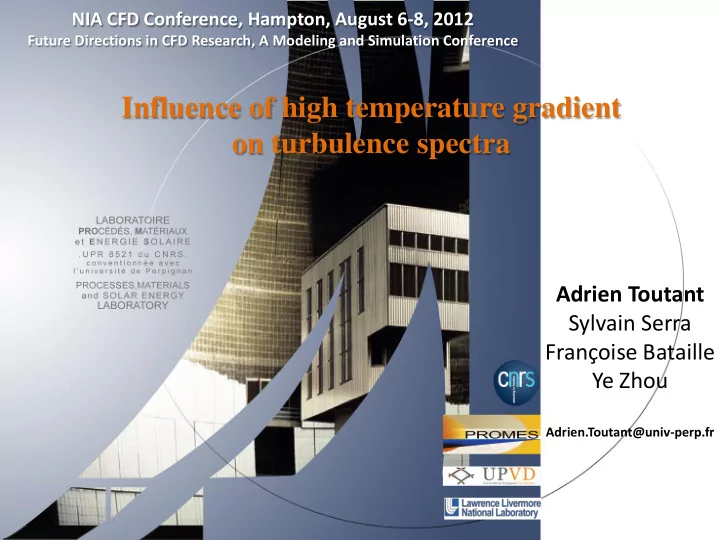

NIA CFD Conference, Hampton, August 6-8, 2012 Future Directions in CFD Research, A Modeling and Simulation Conference Influence of high temperature gradient on turbulence spectra Adrien Toutant Sylvain Serra Françoise Bataille Ye Zhou Adrien.Toutant@univ-perp.fr
Concentrated solar thermal power plant: production of electricity using solar energy. Improve solar power tower plant = improve solar receiver Adrien Toutant 2
The receivers of concentrated solar thermal power plant have two main characteristics: • Asymmetric heating , • Turbulent flow . Study of the coupling between a high temperature gradient and the turbulence . Choice of an academic geometry in order to: • Compare with the literature, • Reduce the computation time, • Avoid errors due to geometry. Periodicity T 2 >T 1 Flow direction 2πh 2h T 1 =293 K y 4πh h = 0.015 m z x Adrien Toutant 3
Re t Turbulence 180 395 intensity (Rec = 3300) (Rec = 6400) T 2 /T 1 Thermal gradient • Moser, Kim & Mansour Re τ : Reynolds (1999) 1 Kim, Moin & Moser (1987) number based • Kawamura (1999,2000) on the wall friction velocity • Debusschere (2004) 1.01 LES realized Rec : Reynolds • Nicoud (1998) number based on the centre Nicoud (1998) DNS and LES 2 velocity realized LES realized 5 LES realized LES realized Literature data (validation of the simulations) LES: large eddy simulation DNS: direct numerical simulation Adrien Toutant 4
• Illustrations of the complex coupling between turbulence and temperature gradient. • Improvement of the understanding of the turbulence/temperature gradient interaction mechanisms. Outline 1. The numerical tool 2. Effects of the temperature gradient 3. “Temperature gradient" time scale 4. Extended inertial range energy spectra model Adrien Toutant 5
Solved equations: • Approximation of low Mach number for an ideal gas • Allow to take into account the dilatational effect due to temperature without solving acoustic . Fluid properties in function of the temperature (Sutherland laws) Adrien Toutant 6
Solved equations: Large Eddy Simulation is the volume average U i is the Favre average • Momentum equation: WALE model • Energy equation: dynamic subgrid scale Prandtl number Solved eddies Sub grid scales Mesh Adrien Toutant 7
CFD software Trio_U developed by CEA-Grenoble (CEA: French Atomic Agency) Trio_U : object oriented programming ( C++ ) adapted to massively parallel computation Staggered grid discretization (pressure at the center of cells, pressure gradient and momentum at the faces of the cells). Time integration: third order Runge-Kutta scheme Convection scheme: • second order centered scheme for velocity • third order quick scheme for temperature Non uniform mesh in the normal direction y 1 At the wall, Adrien Toutant 8
2 Reynolds numbers: 180 and 395 3 temperature ratios: 1, 2 and 5 Very different Reynolds numbers at the hot and cold walls Adrien Toutant 9
Objective: characterization of the coupling between the turbulence and the temperature gradient Statistics: average in time and space along the homogeneous directions (x and z) => profile along y (the direction normal to the walls) Comparison of the non-dimensionalized profiles obtained at the hot and cold sides. Fluctuation profiles for velocity. Localization of the fluctuation maximum. Study of the kinetic energy spectra at this location. Adrien Toutant 10
The profiles become asymmetric with temperature ratio. Fluctuations increase at the cold side and decrease at the hot side. It is not a pure vicous effect (not shown here). Adrien Toutant 11
The profiles become asymmetric with temperature ratio. Fluctuations increase at the cold side and decrease at the hot side. Adrien Toutant 12
Temperature ratio of 1: Kolmogorov slope 5/3 Temperature ratios of 2 and 5: The slope evolves with the temperature gradient Adrien Toutant 13
Considering the energy balance, the dissipation is τ 3 the time scale for the decay of the triple correlation The eddy turn-over or the non-linear time scale is In the classical case, Kolmogorov spectrum Adrien Toutant 14
In our case, life time of triple decorelations depends on • non linear triadic interactions, • external agency here the temperature gradients. Simple choice Assuming temperature gradient applies to largest length scales, we assume is a function. Its parameters have to be determined according to LES results. If → 0, is the dominant time scale. If → ∞, is the dominant time scale. Adrien Toutant 15
According to simulation results, should depend on the following parameters: : local turbulent Reynolds number : turbulent Reynolds number of the hot side : mean turbulent Reynolds number : temperature ratio and should have the following behaviours: ≅ → 1 implies → ∞, 1. OK → 0 implies → 0, 2. ≅ OK implies → 0 hot side and 3. << → ∞ cold side ≅ OK Adrien Toutant 16
Finally, we assume that No temperature gradients, → ∞, → , ~ Big temperature gradients, → 0, → , ~ Adrien Toutant 17
Fit with LES results Adrien Toutant 18
Isothermal Adrien Toutant 19
Adrien Toutant 20
Adrien Toutant 21
Isothermal Adrien Toutant 22
Adrien Toutant 23
Adrien Toutant 24
Adrien Toutant 25
Conclusions: 1. Effect of temperature gradient 2. Determination of a new temperature gradient time scale 3. Development of generalized inertial range energy spectrum 4. Validation of the behavior compared with LES results: - 5/3 slope - 7/3 slope Adrien Toutant 26
Outlook: 1. Add points 5 Slope -5/3 -7/3 Side 2 Cold Hot 1 180 395 2. Increase the precision of the simulations (DNS) 3. Improve the generalized inertial range energy spectrum (more coupling? New parameter values?) 4. Realize spectral studies Acknowledgments: CINES for the calculation resources, CEA – Grenoble for the Trio_U software. Adrien Toutant 27
General conclusion: • very important to study the coupling between turbulence and heat transfers, • understand the interactions • model theses interactions Adrien Toutant 28
Recommend
More recommend